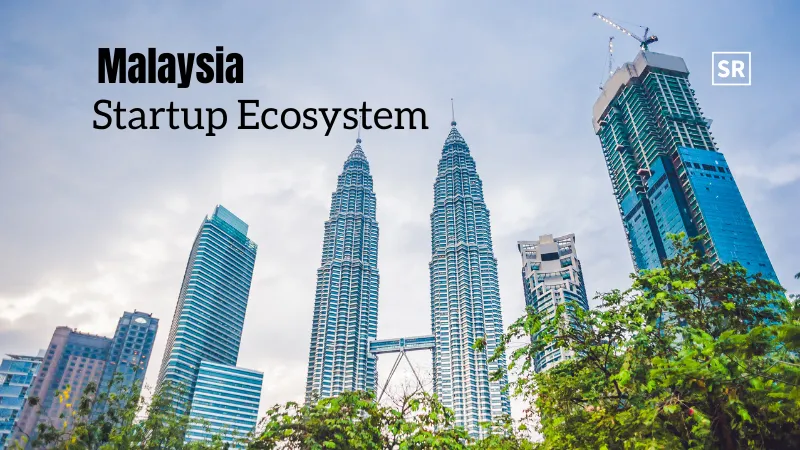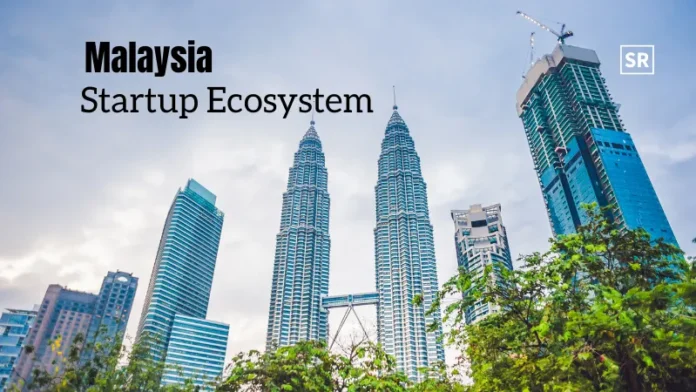
Malaysia, located in Southeast Asia with Kuala Lumpur as its capital, has a stable startup scene in 2025. The country is ranked 43rd globally and 3rd in Southeast Asia for startups. With a population of app. 34.3 million, Malaysia is noted for its strong startup ecosystem in sectors like Edtech, E-commerce and Retail, and Marketing and Sales. It has three cities in the global top 1000 for startups, making it a leading location in Southeast Asia for new businesses. Additionally, Malaysia is ranked 33th out of 133 countries on the Global Innovation Index.
Malaysia Startup Ecosystem 2025
Table of Contents
Malaysia has significant potential due to its strategic location in Asia-Pacific and access to large markets. The country has a skilled workforce and supportive government policies. However the country needs to simplify regulations and reduce bureaucracy to help startups grow and flourish in the Startup Ecosystem of Malaysia. Malaysia has a rich culture and strong government support for innovation. It’s a good place for startups, offering incentives and a diverse community. country is also becoming a hub for green startups due to its focus on renewable energy and sustainability.Malaysia also supports growth in automation robotics, and agricultural tech, which helps modernize and improve these industries.
Digital Penang
Digital Penang plays a significant role in Malaysia’s startup ecosystem by offering programs like SME Go Digital to support early-stage tech startups. A notable achievement for Malaysia was Carsome becoming the country’s first unicorn in 2021, reaching a valuation of over $1 billion. Malaysia aims to create five more unicorns by 2030 with support from private organizations like ScaleUp Malaysia and Proficeo through the 100 Soonicorns Program.
Malaysia is an attractive destination for startups due to its efforts to attract and retain top talent and foster innovation. The government supports startups with initiatives like the Startup Concierge and Single Window service, which simplify business operations. The KL20 GPU Scheme, which provides advanced artificial intelligence resources, underscores Malaysia’s focus on technology.
Read also – Top Food & Beverage Companies in Malaysia
The country is committed to creating a startup-friendly environment through efforts such as the Shared Prosperity Vision 2030 and the MYStartup platform. MYStartup manages the Startup Ecosystem Roadmap (SUPER) 2021-2030, aiming to make Malaysia one of the top 20 startup hubs globally. The Malaysia Digital Economy Corporation supports digital innovation and entrepreneurship. While Kuala Lumpur is the main startup hub, George Town is also developing its ecosystem.
Current Scenario of Startup Ecosystem
Malaysia has over 17,400 startups and two unicorns, the most recent being Edotco in October 2021. No new unicorns have emerged in 2025. Malaysia is also a leader in Islamic Finance, holding the top position in the Global Islamic Economy Indicator for ten years, which offers startups substantial market opportunities and government support.
Malaysia offers a vibrant and supportive startup environment backed by the public and private sectors. Programs like Innovation Belt and Unicorn Golden Pass help attract global talent and promote collaboration. Its strategic location also makes it easier for startups to expand across the region and globally.
There are plenty of funding options—from seed grants to venture capital—with initiatives like the VC Golden Pass and VC Launch Fund driving investments. Services like the Innovation Pass and Founder & Talent Relocation Service help startups tap into a diverse talent pool while Skills@Scale works to upgrade workforce skills.
Malaysia is a strong hub for tech startups, encouraging innovation and growth. While the local market is large, there’s growing hope that more startups will expand beyond it.
Conclusion
In 2025, Malaysia will grow in ICT, renewable energy, e-commerce, and healthcare sectors. These industries are boosting economic development and making Malaysia a competitive player globally. Combining sustainable practices, technological progress, and evolving consumer needs drives this growth.
Investors and foreign companies are evaluating Malaysia’s startup ecosystem for business opportunities. The dynamic environment is well-suited for entrepreneurs who want to grow, innovate and collaborate. The process of starting a business is also straightforward. Malaysia is an attractive destination for startups due to its strategic location, cultural diversity, and strong public and private support, which make it an excellent place for growth and innovation. The country has a fascinating landscape for Malaysia’s startup ecosystem 2025.
Frequently Asked Questions (FAQs)
Q1. What is the startup culture in Malaysia?
Malaysia is an excellent destination for startups, offering a dynamic and supportive environment. The government’s strong focus on innovation and various private sector initiatives create a unique atmosphere that helps startups thrive.
Q2. What is the startup trend in Malaysia?
In Malaysia, several startup trends are emerging, focusing on digital payments, e-commerce, fintech, and Industry 4.0 technologies. Digital payments have become particularly popular due to the growing use of smartphones and the internet.
Q3. What is the most successful business in Malaysia?
The tourism industry is the most profitable sector in Malaysia. In 2022, it contributed about 48 billion Ringgit Malaysia (RM), making it the top revenue-generating sector in the country.





